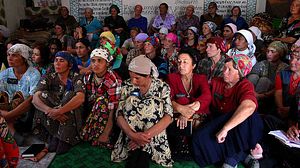Tajikistan does not often make it into the Washington Post, but this week reports that state television had aired a documentary claiming that sex workers in the country were wearing the hijab to drive up their prices, earned Central Asia’s poorest state a headline.
In the piece, the Post echoed reporting by Eurasianet of the Tajik government’s bizarre claims.
From Eurasianet:
Women in the video – whose faces were covered by their veils – said they earned more money by wearing hijab, that the veil made them more attractive to potential clients. In case anyone missed the point, a voiceover explained that the women wear hijab because they are greedy.
The Post also pointed to a report last month by Radio Free Europe/Radio Liberty’s Farangis Najibullah outlining how sex workers in Tajikistan have taken to wearing the hijab to avoid harassment. According to Najibullah, prostitution is a misdemeanor offense in the country subject to a fine, but sex workers are nonetheless victims of social stigma and harassment by police.
The video came days after President Emomali Rahmon’s Mother’s Day speech (made on March 8, better known as International Women’s Day in the rest of the world). Rahmon reportedly criticized those wearing black robes or hijabs, saying such outfits were not traditionally Tajik and that “wearing the hijab and blindly copying a culture that is foreign to us is not the sign of having high moral and ethical standards for women.”
While the hijab (also miniskirts) was banned from schools in 2007, enforcement of the ban was haphazard. Rahmon’s comments raised the issue again, prompting the First Deputy Interior Minister Abdurahmon Alamshozoda to chair a meeting in Dushanbe at the end of March with law enforcement officials, instructing them to be wary of women in “foreign clothes.”
The Tajik government’s targeting of Islam has not been isolated to fashion, either. In last month’s parliamentary election, Central Asia’s only officially registered Islamic political party — the Islamic Renaissance Party of Tajikistan (IRPT) — failed to win any seats in the legislature. The IRPT had been a major part of the opposition during the civil war, which ended in 1997 with a peace deal that promised the opposition 30 percent of ministerial posts, and saw the IRPT legalized in 1998. For the first time in 15 years, the party has no representation in parliament.
Before the election, which observers declared deeply flawed, Jamoliddin Mahmudov, an IRPT leader and member of Tajikistan’s Central Election Commission, was arrested in Dushanbe. Security officials said that two pistols and ammunition were found in the home of another IRPT member, allegedly given to him by Mahmudov in 1996. A series of sex tapes scandalized the country in November, purporting to involve a female party member, and clearly aimed at discrediting the IRPT ahead of the elections.
Mere weeks after the election, imams in state-run mosques began calling for the party’s closure, and a professor at Dushanbe’s Islamic University floated the idea of labeling the party a terrorist group. The IRPT, which maintained a relatively low profile and espoused a moderate platform, is on the brink of losing its toehold of political legitimacy.
A report published by Chatham House in November 2014, authored by John Heathershaw and David W. Montgomery, focused on the myth of post-Soviet Muslim radicalization in Central Asia, noting that the “danger of post-Soviet Muslim radicalization is repeated ad nauseam by the region’s governments” with the aim of dismantling all political opposition and seeking foreign assistance for what is essentially domestic regime security.
Rahmon’s fashion critiques feed into a larger trend of capitalizing on generalized fears of radical Islam stemming largely from the Islamic State group these days, cashing in on that fear with allies, and silencing opposition.

































